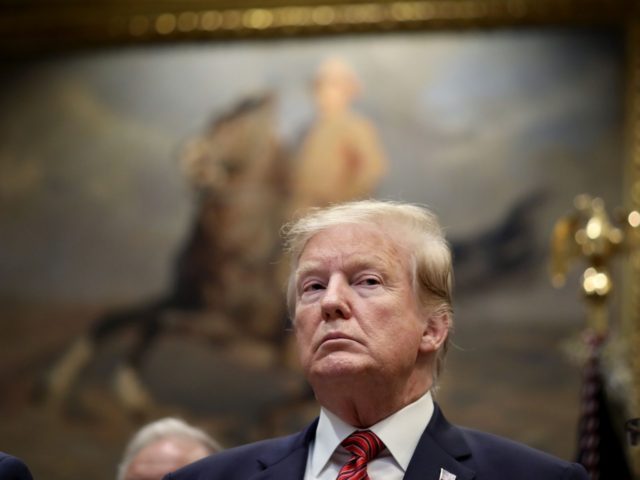President Donald Trump is asserting executive privilege against Democrats’ subpoenas issued to three former White House aides. He should prevail in all three cases, though they may need to go all the way to the Supreme Court.
Partisan Democrats are using their control of the House of Representatives trying to construct a narrative to impeach the president. As part of that hyperpartisan strategy, they are issuing subpoenas to White House aides to compel testimony regarding confidential conversations with the president.
The first was to former White House Counsel Don McGahn, whom House Judiciary Chairman Jerrold Nadler (D-NY) subpoenaed to testify on Tuesday. The president asserted executive privilege over his conversations with McGahn, and McGahn accordingly did not participate in the committee hearing.
Nadler decided to double down during the hearing while the witness chair assigned to McGahn sat vacant, issuing two more subpoenas before adjourning. One was to Annie Donaldson, who had served as McGahn’s chief of staff in the White House Counsel’s Office. The other was to former White House Communications Director Hope Hicks, who had worked for the Trump Organization for years, then followed the president into the White House.
The president is asserting executive privilege to block those subpoenas, as well. All three matters will likely go to federal court in Washington, DC, and the president should eventually win them all.
The Constitution implicitly mandates executive privilege. A president is only a single human being, but one who must make countless decisions that impact millions of people. So he needs to have very frank, direct, confidential conversations with experts and advisers to inform those decisions. Such conversations must be legally protected from disclosure so those experts and advisers can be blunt and fully honest in their recommendations, confident that their words will never be publicly revealed.
The first president to assert executive privilege was George Washington. It has been part of the fabric of national politics through every stage of this nation’s existence.
There are two types of executive privilege: the presidential communications privilege and the deliberative process privilege. The communications privilege is implicated whenever the president is personally involved in a conversation or a written exchange. Although the process privilege can be defeated under various circumstances, the communications privilege is a broad, robust protection that is difficult to overcome in court.
Legal precedent shows that courts look to various factors to determine if executive privilege attaches to a given situation. For example, foreign policy discussions – especially those involving diplomatic secrets or military strategy – are more often covered by privilege than domestic policy matters.
One such factor is whether the conversations involve White House staff. Part of the Constitution’s separation of powers is that only Congress can create the various departments and agencies of the executive branch, as well as the offices a person can hold in that agency. Additionally, one congressional chamber, the Senate, must approve presidential nominees for the top positions in those agencies. Those officers are thus creations of Congress, giving Congress a jurisdictional hook justifying oversight.
But the president is a separate branch of government, independent from Congress, and the White House staff are his personal household assistants, not part of a congressionally created system. The president thus has a much stronger claim to executive privilege regarding discussions with White House staff.
Another factor is seniority. The higher-ranking and more powerful an administration member is, the more a president is entitled to candid conversations with that staff member. McGahn and Hicks both held the rank of assistant to the president, which is a commissioned U.S. officer that is the top rank in the White House, a rank also held by the White House chief of staff and the national security advisor. Donaldson held the rank of deputy assistant to the president, which is only one grade below McGahn and Hicks. The high level of these positions is another factor favoring executive privilege.
Other factors relevant here are attorney-client matters, and whether the president was discussing the exercise of his constitutionally enumerated powers. Those are relevant in at least two of the three cases.
Executive privilege doctrine is underdeveloped in the courts, due in part to the fact that it usually surfaces only when Congress and the White House are controlled by opposing parties, and every two years gives an opportunity for the elected branches of government to get back on the same side, and drop any pending lawsuits. But overall, the current state of the law strongly favors the president here.
However, it is unclear whether the president will win in court before this case reaches the Supreme Court. The outcome in the federal district court in Washington, DC, likely depends on which judge the case is randomly assigned to, as that court has a range of judicial philosophies. But on appeal, the U.S. Court of Appeals for the D.C. Circuit is currently perhaps the third most-liberal appellate court, so the president faces an uphill climb during that intermediate stage of litigation.
There will thus be a rush to get this case before the Supreme Court as quickly as possible. But with the election approaching next year, it is possible – but unlikely – that one of these cases will petition the justices for review before the mid-January 2020 cutoff for cases that the Supreme Court will decide before November 2020.
President Trump is on the right side of the law on these executive privilege claims. The question is whether there is enough time on the clock to make that outcome official before the polls open.
Ken Klukowski is senior legal analyst for Breitbart News. Follow him on Twitter @kenklukowski.

COMMENTS
Please let us know if you're having issues with commenting.